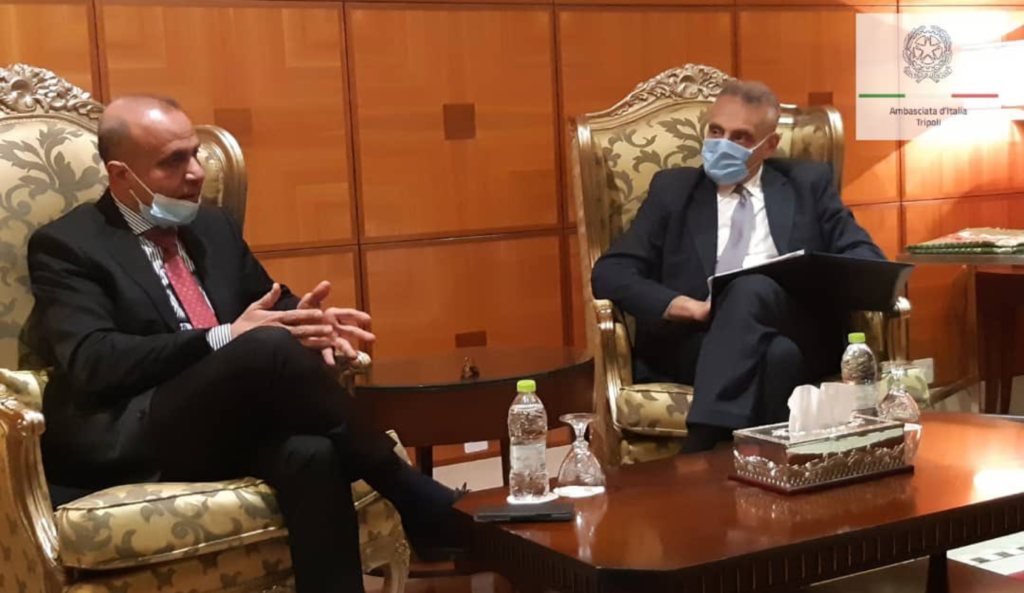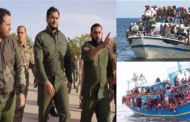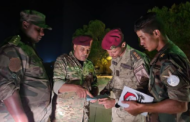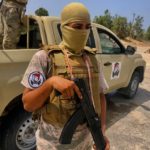on February 11, Pres. Council chairman-elect Menfi meets Haftar in Benghazi.
on February 12, HoR ‘‘Ghadames bloc’’ members vow to hold consultative session in Sabrata to vote confidence in new govt.
on February 14, after visiting Tobruk, Pres. Council chairman-elect Menfi meets HoR speaker Saleh in Al-Qubbah.
on February 14, GNA PM Al-Sarraj leaves Libya for undisclosed destination, appoints deputy Maetig to replace him.
SIRTE
- on February 14, PM Fayez Al-Sarraj reportedly left Libya and assigned Ahmed Maetig the duties of leading over the Libyan Presidential Council, without mentioning where he would leave.
- on February 14, sources reported that The Mines and Remnants of War Clearance Unit had started the second phase of the process of clearing mines and war remnants in the vicinity of the city of Sirte, from Abu Grain to Al-Khamseen Gate west of Sirte. The Unit also confirmed the completion of the first phase of the process from the entire coastal road to the Al-Khamseen Gate, in cooperation with the Criminal Investigation Department in Misrata;
SEBHA
- on February 11, a partial three-day lockdown became effective in Sabha, after the Municipal Council considered it important to introduce new measure amidst an increasing number of Coronavirus infectionson February;
INTERNATIONAL RELATIONS
- on February 14, the Prime Minister-elect of the National Unity Government, Abdul-Hamid Dbeibah has welcomed the Italian Minister of Foreign Affairs Luigi Di Maio’s phone call, noting that the latter confirmed Italy’s continued support for Libya through all the common files. Dbeibah also welcomed in a tweet his meeting with the Italian ambassador, Giuseppe Buccino, praising the Italian efforts and the continued presence of the embassy in Libya despite all the difficult circumstances that the country has gone through.;
- on February 14, the Head of the High Council of State (HCS), Khaled Al-Mishri, discussed on with the German ambassador to Libya, Oliver Owcza, ways to support the new executive authority in Libya, the latest political developments, national reconciliation and ways of creating conditions for the December 2021 elections;
- on February 14, PM-elect Dbeibah met with the Governor of the Central Bank of Libya (CBL), Al-Siddiq Al-Kabir, in Tripoli, reviewing efforts to ensure financial and monetary stability as well as the unification of state institutions to achieve national goals;
- on February 14, the President-elect of the Presidential Council, Mohammed Menfi met in Al-Qubbah, eastern Libya, with Tobruk-based House of Representatives Speaker Aguila Saleh, and discussed the vote of confidence for the yet-to-be-formed interim government, Menfi was received by Saleh as part of the former’s visit to Al-Baydaa city, his third stop in eastern Libya after Benghazi and Tobruk;
- on February 13, in a telephone call with the new UN envoy to Libya, Jan Kubis, Russian Foreign Minister, Sergey Lavrov, emphasized there is no alternative to the Libyan crisis other than a political settlement. Lavrov indicated Russia’s eagerness to communicate closely with the UN mediation and its determination to play an important role in coordinating the peace process;
- on February 13, the Libyan Foreign Minister, Mohamed Siyala, held discussions by phone with his Algerian counterpart Sabri Boukadoum, to discuss bilateral relations and how to improve joint cooperation across the board, as well as the present political process in Libya and the election of the new executive authority;
- on February 13, the Syrian Observatory for Human Rights (SOHR) revealed that Turkey is preparing to send a new group of Syrian mercenaries to Libya, amidst international calls for the removal of all foreign fighters from Libya, a few days after cancelling the return of another group of 140 mercenaries from Libya to Syria. The reasons for this remain unknown;
- on February 12-13, new UNSMIL head Jan Kubis held a wide range of consultations with domestic and international stakeholders on how to move the Libyan process forward;
- on February 12, over 100 parliamentarians of the so-called ‘‘Ghadames bloc’’ of the Libyan House of Representatives (HoR) planned to hold a consultative session in the western coastal city of Sabrata at the beginning of the following week [as of February 15, the meeting is yet to take place due to the absence of many MPs]. The Sabrata meeting’s main goal is to provide the newly elected executive body with a vote of confidence so as to allow it to start working as soon as possible;
- on February 12, France’s Minister of Foreign Affairs, Jean-Yves Le Drian, called for the urgent departure of foreign forces and mercenaries from Libya. He confirmed his country’s support for international efforts to end the political crisis and foreign interference in Libya;
- on February 12, the Italian ambassador to Libya, Giuseppe Buccino, held discussions with the Vice President-elect of the Presidential Council, Abdullah Al-Lafi. The Italian embassy said that “the two sides had an extensive exchange of views with a focus on reconciliation, elections and the decisive role of parliament;

- on February 12, Mohammad Menfi received on Friday a phone call from the US ambassador, Richard Norland. The two sides reviewed bilateral relations and issues of common interest. Norland also confirmed his country’s support for the new PC and government to perform their duties;
- on February 12, British lawyer Karim Khan, who had controversially acted as defense counsel for Saif Al-Islam Gaddafi, had been elected Prosecutor of the International Criminal Court to succeed the current Prosecutor, Fatou Bensouda. Karim Khan will assume the presidency of the court for nine years, starting next June, 16;

- on February 12, the media office of Libya’s newly-elected interim Prime Minister, Abdel-Hamid Dbeibeh announced that he had begun consultations with Libyan parties to form a new government;
- on February 11, during a phone call, the vice-President of the GNA Presidential Council, Ahmed Maetig, agreed with UN special envoy Jan Kubis on the need for coordination between the tracks of the Libyan dialogue. They also reviewed the latest developments in the Libyan situation, as well as the steps taken to solve the Libyan crisis in the political, economic, and military tracks;

- on February 11, US President, Joe Biden extended the national emergency with respect to Libya by one year, and notified House of Representatives Speaker, Nancy Pelosi and the Senate leadership in a letter, saying he determined it necessary to continue the national emergency;
- on February 11, Libya’s newly selected Presidency Council head, Mohamed Menfi landed from Athens in Benghazi, where he met LNA commander Khalifa Haftar, rather than the elected Aguila Saleh, head of the HoR. Menfi met Hafter at a Benghazi hotel. He did not go to meet Hafter at his Rajma headquarters. Haftar expressed his support to the new executive body and pledged cooperation in the next phase’.

- on February 10, GNA Defense Minister, Salah al-Namroush, discussed in Tripoli with the commander of British special forces, Gwyn Jenkins, the latest security developments in Libya. Al-Namroush reiterated hope that the UK would expand military cooperation with Libya, especially in anti-terrorism and organized crime efforts as well as in clearing mines. Jenkins hailed the support of the Defense Ministry to the British special forces in Libya, saying the UK will continue to support peace and stability across the country;
- on February 9, the Egyptian Intelligence Chief, Major-General met with GNA Foreign Minister Siyala in Cairo on the sidelines of the Arab League Council meetings. Kamel reiterated his government’s support for the new executive authority in Libya, wishing it will carry out its responsibilities;

- on the same occasione, Siyala also met with the Iraqi Foreign Minister, Fouad Hussein. The two officials discussed the possible reopening of the Iraqi embassy in Tripoli, bilateral relations, as well as regional and international issues.

- on February 9, Chief of Staff, Lt. Gen. Muhammad Al-Haddad, held a consultative meeting with the GNA 5 + 5 Military Committee, the field subcommittee, and field engineering officers at the Abu Sitta Naval Base. The meeting dealt with means of providing capabilities and financial rewards for the supporting force in the Sirte Al-Jufra Liberation Operations Room;
- on February 9, a meeting described as “cordial” was held between the new Prime Minister-elect, Abdul-Hamid Dbeibah and the Italian ambassador to Libya, Giuseppe Buccino. Dbeibah acknowledged and praised the fact that the Italian embassy remained open throughout the war;

- on February 9, the new UN envoy, Jan Kubis, held virtual talks with the Chairman-elect of the Presidential Council (PC), Mohammad Menfi, on ways of strengthening the political process and the many challenges to be faced by the next stage. The talks covered aspects of future cooperation between the PC and the UN mission to find the necessary consensus between all parties to the Libyan crisis;
- on February 8, the Vice President of the Scientific Advisory Committee to Combat the Coronavirus Pandemic confirmed that Libya had secured the provision of 2.8m doses of vaccine to immunize 1.4m Libyan citizens;
- on February 8, High Council of State chairman Khaled Al-Mishri discussed with UNSMIL coordinator Raisedon Zenenga the challenges which may possibly face the new National Unity Government and the new Presidential Council (PC). Both sides reviewed the agreements reached by the Libyan Political Dialogue Forum (LPDF) in Geneva. Zenenga promised to convey all the ideas covered in the meeting to the United Nations;

- on February 8, Zenenga also met with the Vice Chairman of the Presidential Council, Ahmed Maetig, to discuss the mechanism for consolidating the budget and the forthcoming steps to be taken in the opening of the coastal road;
- on February 8, GNA Foreign Minister Mohammed Sayala met with the Egyptian Foreign Minister, Sameh Shoukry on the sidelines of the emergency meeting of the Arab League. Shoukry affirmed his country’s firm stance towards Libya in order to find a negotiated, intra-Libyan political solution that preserves its sovereignty and preserves the capabilities of its people.

























